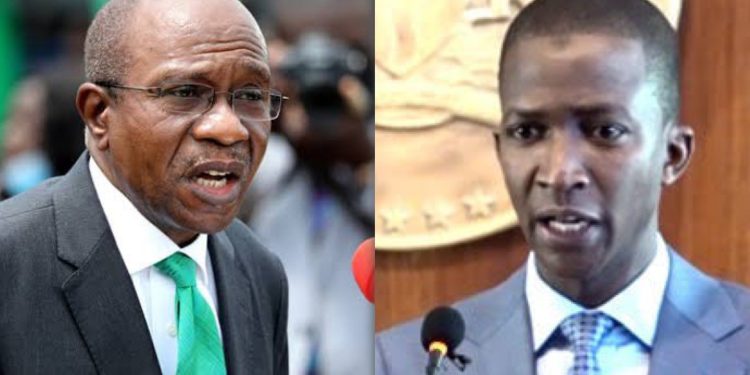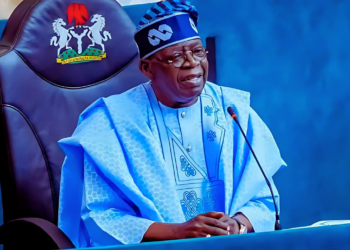In what has become a concerning pattern of undermining justice, the detention of former Central Bank of Nigeria (CBN) Governor Godwin Emefiele under the administration of President Tinubu has raised significant questions about the rule of law and the fight against corruption in Nigeria.
The circumstances surrounding Emefiele’s arrest, coupled with the removal of the head of the Economic and Financial Crimes Commission (EFCC), Abdulrasheed Bawa immediately after Tinubu took office, cast a shadow over the government’s commitment to transparency and due process.
How we got here: During the 2023 election season, there were conflicting signals as to what role Emefiele’s widely condemned cash policy was meant to play. The policy had the capacity to deny money bags a free hand in any plan to buy the voters, but it also brought hardship to the citizenry.
The then candidate Bola Tinubu suggested that this policy was targeted at him, to stop him from winning the presidential election. He did not clarify satisfactorily enough how that was meant to play out or whether it affected his plans to buy votes.
In a related development, it was also discussed in the public space that there was clandestine arrangement to provide enough cash to the Tinubu campaign, being the candidate of the ruling APC. This was irrespective of the fact that the whole nation was reeling from cash scarcity as a result of the CBN policy.
There was never any evidence of both claims. However, the Abdulrasheed Bawa, who was then the Charman of the EFCC publicly acknowledged that Bola Tinubu was under investigation by the Commission. This apparently did not go down well with the APC candidate.
Emerging from this challenges, Bola Tinubu went ahead to win the 2023 presidential election, albeit in most controversial way. On taking office, the first of his official functions was the suspension (and effective removal) of both Emefiele and Bawa from office. Both are today languishing in detention.
How things are now unfolding: This development has led to speculation that the detention of these two former government functionaries in very sensitive positions may be politically motivated rather than a genuine pursuit of justice or anti-corruption fight. This situation raises concerns about the independence of institutions meant to safeguard the rule of law and enforce accountability.
Furthermore, the removal of the EFCC head shortly after Tinubu’s assumption of office sends a worrying message about the state of anti-corruption efforts in Nigeria. To be clear, under former President Buhari, the image of anti-corruption fight was severely tarnished.
This seems to be continuing very early in the life of the new administration in Nigeria. The sudden removal of these men and the apparently disconnected efforts of the DSS to continually hold Emefiele in detention through what seems like frivolous charges is very worrisome.
Everything currently playing out raises questions about the government’s commitment to the fight against corruption, especially when it involves high-profile individuals. Such actions erode public trust in the justice system and may discourage whistleblowers and witnesses from coming forward.
Emefiele’s detention serves as a stark reminder of the need for an independent judiciary that upholds the principles of the rule of law. The failure to adhere to proper legal procedures, combined with political alliances that appear to influence justice, sets a dangerous precedent for the future.
Unintended consequences: The repercussions of this erosion of accountability and transparency in the criminal justice system in Nigeria extend beyond Emefiele’s case, impacting how government officials handle cases involving other high-profile politicians and public figures.
Predictions suggest that the current trajectory may lead to an environment where selective prosecution becomes more common, depending on the political affiliation or alliances of individuals.
This not only undermines the integrity of the justice system but also perpetuates a culture of impunity among the political elite. Ultimately, the fate of Emefiele, the removal of the EFCC head, and the lack of adherence to the rule of law highlight the pressing need to salvage the justice system.
It brings to the fore the urgency of the need for Nigeria’s government to reaffirm its commitment to justice, transparency, and accountability for the betterment of the nation and its citizens.












